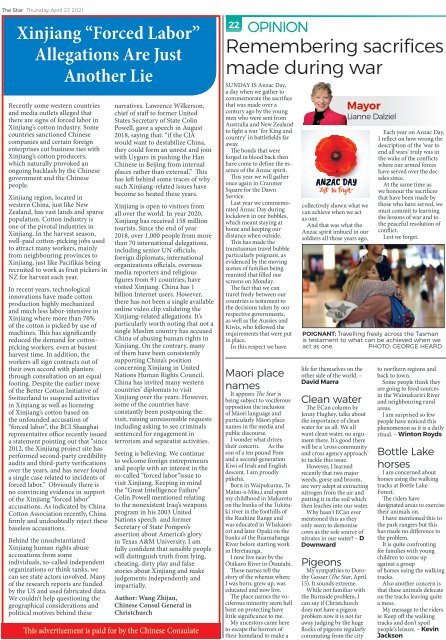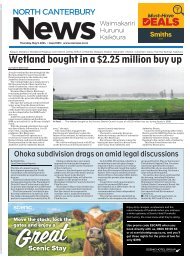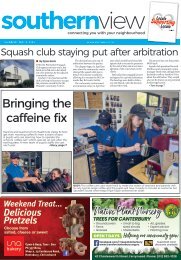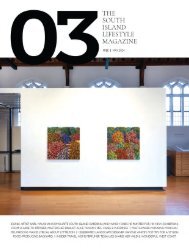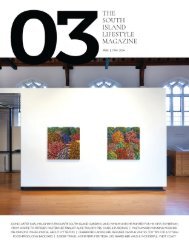The Star: April 22, 2021
You also want an ePaper? Increase the reach of your titles
YUMPU automatically turns print PDFs into web optimized ePapers that Google loves.
<strong>The</strong> <strong>Star</strong> Thursday <strong>April</strong> <strong>22</strong> <strong>2021</strong><br />
Xinjiang “Forced Labor”<br />
Allegations Are Just<br />
Another Lie<br />
Recently some western countries<br />
and media outlets alleged that<br />
there are signs of forced labor in<br />
Xinjiang’s cotton industry. Some<br />
countries sanctioned Chinese<br />
companies and certain foreign<br />
enterprises cut business ties with<br />
Xinjiang’s cotton producers,<br />
which naturally provoked an<br />
ongoing backlash by the Chinese<br />
government and the Chinese<br />
people.<br />
Xinjiang region, located in<br />
western China, just like New<br />
Zealand, has vast lands and sparse<br />
population. Cotton industry is<br />
one of the pivotal industries in<br />
Xinjiang. In the harvest season,<br />
well-paid cotton-picking jobs used<br />
to attract many workers, mainly<br />
from neighbouring provinces to<br />
Xinjiang, just like Pacifikas being<br />
recruited to work as fruit pickers in<br />
NZ for harvest each year.<br />
In recent years, technological<br />
innovations have made cotton<br />
production highly mechanized<br />
and much less labor-intensive in<br />
Xinjiang where more than 70%<br />
of the cotton is picked by use of<br />
machines. This has significantly<br />
reduced the demand for cottonpicking<br />
workers, even at busiest<br />
harvest time. In addition, the<br />
workers all sign contracts out of<br />
their own accord with planters<br />
through consultation on an equal<br />
footing. Despite the earlier move<br />
of the Better Cotton Initiative of<br />
Switzerland to suspend activities<br />
in Xinjiang as well as licensing<br />
of Xinjiang’s cotton based on<br />
the unfounded accusation of<br />
“forced labor”, the BCI Shanghai<br />
representative office recently issued<br />
a statement pointing out that “since<br />
2012, the Xinjiang project site has<br />
performed second-party credibility<br />
audits and third-party verifications<br />
over the years, and has never found<br />
a single case related to incidents of<br />
forced labor.” Obviously there is<br />
no convincing evidence in support<br />
of the Xinjiang “forced labor”<br />
accusations. As indicated by China<br />
Cotton Association recently, China<br />
firmly and undoubtedly reject these<br />
baseless accusations.<br />
Behind the unsubstantiated<br />
Xinjiang human rights abuse<br />
accusations from some<br />
individuals, so-called independent<br />
organizations or think tanks, we<br />
can see state actors involved. Many<br />
of the research reports are funded<br />
by the US and used fabricated data.<br />
We couldn’t help questioning the<br />
geographical considerations and<br />
political motives behind these<br />
narratives. Lawrence Wilkerson,<br />
chief of staff to former United<br />
States Secretary of State Colin<br />
Powell, gave a speech in August<br />
2018, saying that: “if the CIA<br />
would want to destabilize China,<br />
they could form an unrest and join<br />
with Uygurs in pushing the Han<br />
Chinese in Beijing from internal<br />
places rather than external.” This<br />
has left behind some traces of why<br />
such Xinjiang-related issues have<br />
become so heated these years.<br />
Xinjiang is open to visitors from<br />
all over the world. In year 2020,<br />
Xinjiang has received 158 million<br />
tourists. Since the end of year<br />
2018, over 1,000 people from more<br />
than 70 international delegations,<br />
including senior UN officials,<br />
foreign diplomats, international<br />
organizations officials, overseas<br />
media reporters and religious<br />
figures from 91 countries, have<br />
visited Xinjiang. China has 1<br />
billion Internet users. However,<br />
there has not been a single available<br />
online video clip validating the<br />
Xinjiang-related allegations. It’s<br />
particularly worth noting that not a<br />
single Muslim country has accused<br />
China of abusing human rights in<br />
Xinjiang. On the contrary, many<br />
of them have been consistently<br />
supporting China’s position<br />
concerning Xinjiang in United<br />
Nations Human Rights Council.<br />
China has invited many western<br />
countries’ diplomats to visit<br />
Xinjiang over the years. However,<br />
some of the countries have<br />
constantly been postponing the<br />
visit, raising unreasonable requests<br />
including asking to see criminals<br />
sentenced for engagement in<br />
terrorism and separatist activities.<br />
Seeing is believing. We continue<br />
to welcome foreign entrepreneurs<br />
and people with an interest in the<br />
so-called “forced labor”issue to<br />
visit Xinjiang. Keeping in mind<br />
the “Great Intelligence Failure”<br />
Colin Powell mentioned relating<br />
to the nonexistent Iraq’s weapons<br />
program in his 2003 United<br />
Nations speech and former<br />
Secretary of State Pompeo’s<br />
assertion about America’s glory<br />
in Texas A&M University, I am<br />
fully confident that sensible people<br />
will distinguish truth from lying,<br />
cheating, dirty play and false<br />
stories about Xinjiang and make<br />
judgements independently and<br />
impartially.<br />
Author: Wang Zhijan,<br />
Chinese Consul General in<br />
Christchurch<br />
This advertisement is paid for by the Chinese Consulate<br />
<strong>22</strong><br />
OPINION<br />
Remembering sacrifices<br />
made during war<br />
SUNDAY IS Anzac Day,<br />
a day when we gather to<br />
commemorate the sacrifice<br />
that was made over a<br />
century ago by the young<br />
men who were sent from<br />
Australia and New Zealand<br />
to fight a war ‘for King and<br />
country’ in battlefields far<br />
away.<br />
<strong>The</strong> bonds that were<br />
forged in blood back then<br />
have come to define the essence<br />
of the Anzac spirit.<br />
This year we will gather<br />
once again in Cranmer<br />
Square for the Dawn<br />
Service.<br />
Last year we commemorated<br />
Anzac Day during<br />
lockdown in our bubbles,<br />
which meant staying at<br />
home and keeping our<br />
distance when outside.<br />
This has made the<br />
transtasman travel bubble<br />
particularly poignant, as<br />
evidenced by the moving<br />
scenes of families being<br />
reunited that filled our<br />
screens on Monday.<br />
<strong>The</strong> fact that we can<br />
travel freely between our<br />
countries is testament to<br />
the decisions taken by our<br />
respective governments,<br />
as well as the Aussies and<br />
Kiwis, who followed the<br />
requirements that were put<br />
in place.<br />
In this respect we have<br />
Maori place<br />
names<br />
It appears <strong>The</strong> <strong>Star</strong> is<br />
being subject to vociferous<br />
opposition the inclusion<br />
of Māori language and<br />
particularly Māori place<br />
names in the media and<br />
public discourse.<br />
I wonder what drives<br />
their concern. As the<br />
son of a ten pound Pom<br />
and a second-generation<br />
Kiwi of Irish and English<br />
descent. I am proudly<br />
pākehā.<br />
Born in Waipukurau, Te<br />
Matau-a-Māu,i and spent<br />
my childhood in Makaretu<br />
on the banks of the Tukituki<br />
river in the foothills of<br />
the Ruahine Range and<br />
was educated in Whakaoriori<br />
and later Opaki on the<br />
banks of the Ruamahanga<br />
River before starting work<br />
in Heretaunga.<br />
I now live near by the<br />
Ōtākaro River in Ōtautahi.<br />
<strong>The</strong>se names tell the<br />
story of the whenua where<br />
I was born, grew up, was<br />
educated and now live.<br />
<strong>The</strong> place names the vociferous<br />
minority seem hell<br />
bent on protecting have<br />
little significance to me.<br />
My ancestors came here<br />
to escape the horrors of<br />
their homeland to make a<br />
collectively shown what we<br />
can achieve when we act<br />
as one.<br />
And that was what the<br />
Anzac spirit imbued in our<br />
soldiers all those years ago.<br />
life for themselves on the<br />
other side of the world. –<br />
David Marra<br />
Clean water<br />
<strong>The</strong> ECan column by<br />
Jenny Hughey, talks about<br />
the importance of clean<br />
water for us all. We all<br />
want clean water, no argument<br />
there. It’s good there<br />
will be a ‘cross community<br />
and cross agency approach’<br />
to tackle this issue.<br />
However, I learned<br />
recently that two major<br />
weeds, gorse and broom,<br />
are very adept at extracting<br />
nitrogen from the air and<br />
putting it in the soil which<br />
then leaches into our water.<br />
Why hasn’t ECan ever<br />
mentioned this as they<br />
only seem to demonise<br />
cows as the sole source of<br />
nitrates in our water? – D<br />
Downward<br />
Pigeons<br />
My sympathies to Dorothy<br />
Gosser (<strong>The</strong> <strong>Star</strong>, <strong>April</strong><br />
15). It sounds extreme.<br />
While not familiar with<br />
the Burnside problem, I<br />
can say if Christchurch<br />
does not have a pigeon<br />
problem now it is not far<br />
away judging by the huge<br />
flocks of pigeons regularly<br />
commuting from the city<br />
Mayor<br />
Lianne Dalziel<br />
Each year on Anzac Day,<br />
I reflect on how wrong the<br />
description of the ‘war to<br />
end all wars’ truly was in<br />
the wake of the conflicts<br />
where our armed forces<br />
have served over the decades<br />
since.<br />
At the same time as<br />
we honour the sacrifices<br />
that have been made by<br />
those who have served, we<br />
must commit to learning<br />
the lessons of war and to<br />
the peaceful resolution of<br />
conflict.<br />
Lest we forget.<br />
POIGNANT: Travelling freely across the Tasman<br />
is testament to what can be achieved when we<br />
act as one.<br />
PHOTO: GEORGE HEARD<br />
to northern regions and<br />
back to town.<br />
Some people think they<br />
are going to food sources<br />
in the Waimakariri River<br />
and neighbouring rural<br />
areas.<br />
I am surprised so few<br />
people have noticed this<br />
phenomenon as it is a daily<br />
ritual. – Winton Royds<br />
Bottle Lake<br />
horses<br />
I am concerned about<br />
horses using the walking<br />
tracks at Bottle Lake<br />
Forest.<br />
<strong>The</strong> riders have<br />
designated areas to exercise<br />
their animals on.<br />
I have mentioned this to<br />
the park rangers but this<br />
has made no difference to<br />
the problem.<br />
It is quite confronting<br />
for families with young<br />
children to come up<br />
against a group<br />
of horses using the walking<br />
tracks.<br />
Also another concern is<br />
that these animals defecate<br />
on the tracks leaving quite<br />
a mess.<br />
My message to the riders<br />
is: Keep off the walking<br />
tracks and don’t spoil<br />
people’s leisure. – Kevin<br />
Jackson


